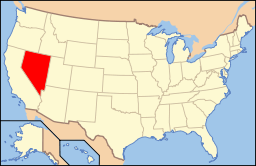Nevada wine
| Wine region | |
 | |
| Official name | State of Nevada |
|---|---|
| Type | U.S. state |
| Year established | 1864 |
| Years of wine industry | 1990 to present |
| Country | United States |
| Sub-regions | None |
| Total area | 110,567 square miles (286,367 km2) |
| Size of planted vineyards | Under 40 acres |
| No. of vineyards | 8 |
| Grapes produced | Cabernet Sauvignon, Chardonnay, Cinsault, Frontenac, Gewürztraminer, La Crosse, Merlot, Riesling, Roussillon, Ruby Cabernet, Petite Sirah, Semillon, Syrah, Tempranillo, Zinfandel |
| No. of wineries | 4 |
Nevada wine refers to wine made from grapes grown in the U.S. state of Nevada, where wine has been produced since 1990. There are currently no designated American Viticultural Areas in Nevada.
Nevada has four commercial wineries: Churchill Vineyards in Fallon, Tahoe Ridge in Minden, Pahrump Valley Winery in Pahrump and the newest, Sanders Family Winery (also located in Pahrump).
The high boron content of the soil,[1][2] soil salinity, and hard water provide several impediments to growing grapes, especially vitis vinifera. University of Nevada, Reno professor Dr. Grant Cramer is currently studying the best varietals and techniques[3] at UNR's Valley Road Vineyard. Despite the difficulties of growing grapes in Nevada, grapes have been grown in both the northern and southern part of the state since 1991,[4] and all four wineries have produced wines made from grapes grown in Nevada.
State law[5] restricts commercially operated wineries to counties with no more than 100,000 people. Instructional wine-making facilities (such as the Valley Road Vineyard) may operate in any county but must meet special license requirements and are restricted to selling or distributing no more than 60 gallons of wine in any 12-month period.[6]
See also
References
External links
- Appellation America: Nevada State Profile
- Appellation America: Pahrump Valley Winery defining Southern Nevada diversity
- Dr. Grant Cramer's home page
- Home Vineyards in Northern Nevada
- Nevada Wine Tasting blog
- Now and Zin, Wine Country: Nevada - Pahrump Valley